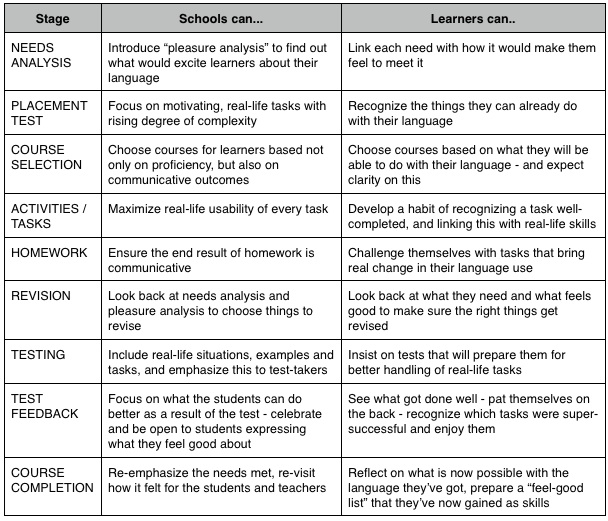 This is a summary of an hour-long Twitter chat that took place on Wednesday, 27 November. ELTChat is a pow-wow for teachers of English – and each week, two chats are held on a variety of language-related topics. Even if you’ve never taught or learned English, grab a strong coffee (tweets fly fast, stay sharp) and jump in. Click through to find out how: here’s the main page and here’s the Facebook community.
This is a summary of an hour-long Twitter chat that took place on Wednesday, 27 November. ELTChat is a pow-wow for teachers of English – and each week, two chats are held on a variety of language-related topics. Even if you’ve never taught or learned English, grab a strong coffee (tweets fly fast, stay sharp) and jump in. Click through to find out how: here’s the main page and here’s the Facebook community.
Disclosure: The topic of this chat was “How to be an ELT writer.” I work for one of the publishing companies mentioned during the chat. For the sake of clarity and just to be OK with the whole topic, most names of ELT publishing companies are missing from the summary. Go & check out the transcript to find out more (well worth a look). Right. With all the preambles done…
1. Where to begin? Useful starting points for ELT writers
We’ve been fortunate to have a few chatters around who write, used to write or supported writers in some way. This meant that tips for starting out and accessing useful resources or platforms were shared easily. In recent years, there has been more and more support for those who want to start out with their big ELT writing idea. Here’s just a handful:
– IATEFL Materials Writing SIG (Special Interest Group) – this community supports and brings together ELT material writers. Suggested by @SueAnnan, but well-loved by many #ELTchatters.
– English Teaching Professional or OneStopEnglish – both platforms accept lesson ideas and resource submissions, and can become useful springboards for the illustrious writing careers we all dream of. Suggested by @teflerinha.
– ELT Teacher 2 Writer – a database for teachers who want to write. Big publishers signed up and reportedly use the database for their talent search – can you afford not to take that chance? Suggested by @ShaunWilden.
– “How ELT Publishing Works” – @JoeMcVeigh reviewed and suggested this book.
2. What does it take to be a writer?
This was much harder to explain, and difficult to summarize – again, the transcript is brimming with ideas. A few key points to mention here:
– Knowledge of rubrics and levels at which vocabulary items are likely to be used – this, suggested by @teflerinha, sounds like a technical and demanding skill that inexperienced ELT writers could struggle with.
– “Imagine materials used in settings other than your own by teachers other than you.” – @JoeMcVeigh and a statement you can’t disagree with.
– A good relationship with the team around you – we spent quite some time discussing the great (and not so great) editors, as well as the joys and pains of working in a profit-driven team whose members you often don’t meet for a lot of the time.
3. Questions and doubts
For all its splendor and irresistible allure (okay, go with me on this one), ELT writing does raise a few issues and we certainly didn’t hold back here. Just a selection of the more interesting questions – feel free to tackle them in the comments below:
– Are non-native speakers good enough to write ELT materials? – @HanaTicha asked and #ELTChat responded with a resounding yes. This is where experienced editors help you out…
– Should you aim for big, global publishers, or use your experience in local contexts? – The situation described by @naomishema – and the resources mentioned by @Marisa_C – both seem to work well in the regions / settings where they were prepared.
– How do today’s aspiring writers prepare for the future in a long-term planning industry? – This is what I really wanted to know. Assume that the idea you have today will be published in 2015 (if you’re lucky and persuasive). What will have changed by then? (A quick un-related blog post to give you the idea of what I mean)
4. Famous last words
I’ll just leave them here. Reflect, respond and make sure you make the next #ELTChat – there are two every Wednesday.
– “Publishing is a business and operates with business principles. Sometimes a shock to the system for those of us from educational background”
– “You will learn a lot with every job you do. That’s one of the pleasures.”
(Photo credit: eltpics – some rights reserved)
Wiktor (Vic) Kostrzewski (MA, DELTA) is an author, translator, editor and project manage based in London. When he works, he thinks about languages, education, books, EdTech and teachers. When he doesn’t work, he probably trains for his next triathlon or drinks his next coffee.
BRAVE Learning (formerly known as 16 Kinds) is a lifelong learning and productivity blog. If you enjoy these posts, please check out one of my books and courses.
My recent publications, and my archive, is now all available on my new project: PUNK LEARNING. Hope to see you there!
 My religious traditions are chaotic – my enthusiasm for American customs even more so – but every year, I keep thinking it’s a good idea to specify why learning and teaching is worth giving thanks for. So here it is, in 2015 – six good reasons to give thanks for learning. Some are as true this year as they’ve ever been; others are recent developments; all of them are subjective and I’m looking forward to hearing about your version.
My religious traditions are chaotic – my enthusiasm for American customs even more so – but every year, I keep thinking it’s a good idea to specify why learning and teaching is worth giving thanks for. So here it is, in 2015 – six good reasons to give thanks for learning. Some are as true this year as they’ve ever been; others are recent developments; all of them are subjective and I’m looking forward to hearing about your version.








